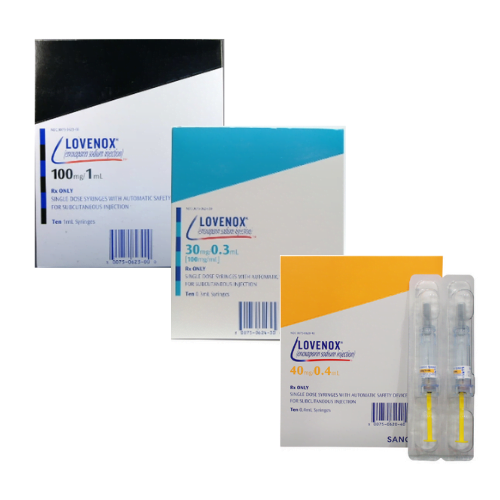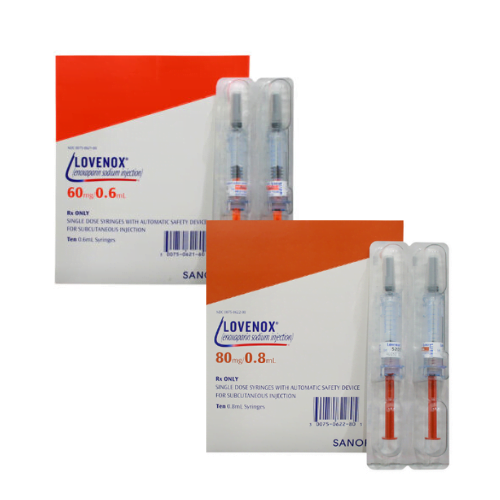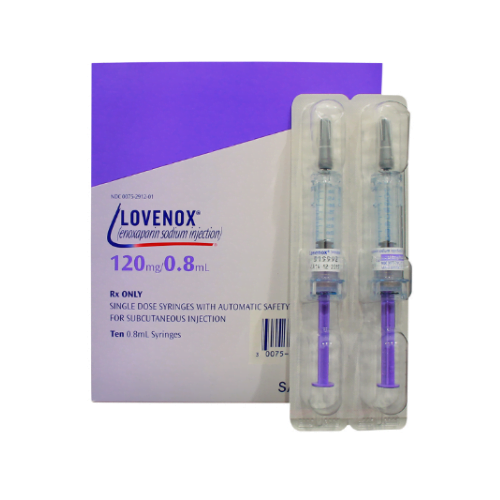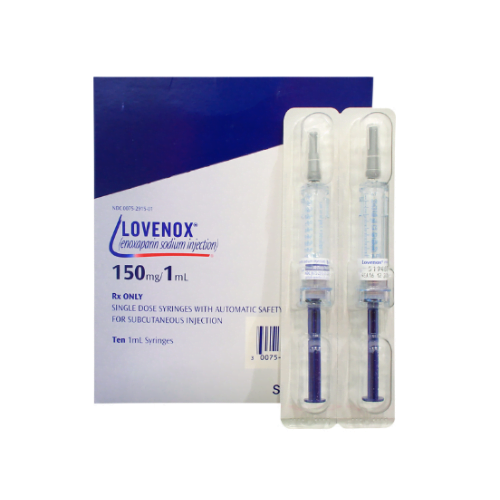Please note: a valid prescription is required for all prescription medication.
What Lovenox® Is and How It Works
Lovenox® (enoxaparin) is a low molecular weight heparin used to prevent and treat blood clots. It helps reduce the risk of deep vein thrombosis and pulmonary embolism in medical and surgical settings, and it is also used in certain acute coronary syndromes. Many patients choose Lovenox Injections through Canadian pricing, with US delivery from Canada and prompt, express, cold-chain shipping. For those paying cash, even without insurance, predictable dosing and wide availability make it a practical option when clinically appropriate.
Every CanadianInsulin order is prescription-checked with your clinic and dispensed by a licensed Canadian pharmacy.
Enoxaparin primarily enhances inhibition of factor Xa, decreasing thrombin generation and clot formation. Compared with unfractionated heparin, it offers more predictable anticoagulation and does not typically require routine laboratory monitoring in most adults with stable kidney function.
Who Lovenox® Is For
Label indications include prevention of venous thromboembolism in medical patients at risk for clotting, prophylaxis after orthopedic or general surgery, treatment of deep vein thrombosis with or without pulmonary embolism, and reduction of ischemic complications in unstable angina, non‑ST elevation myocardial infarction, and certain cases of ST‑elevation myocardial infarction.
Use with caution in patients at higher bleeding risk, including those with recent surgery, active ulcers, severe liver disease, uncontrolled hypertension, or concomitant antiplatelet or anticoagulant therapy. It is generally avoided in active major bleeding, in patients with a history of heparin-induced thrombocytopenia, and in those with hypersensitivity to enoxaparin, heparin, or pork products. Dose adjustments and careful monitoring may be needed in significant renal impairment.
For condition background, see deep vein thrombosis. For therapy options across this class, explore anticoagulation therapy.
Dosage and Usage
Dosing is individualized by the prescriber and depends on indication, body weight, kidney function, and concurrent medicines. Commonly published approaches include once-daily or twice-daily subcutaneous dosing for treatment of DVT/PE, fixed daily dosing for medical and surgical prophylaxis, and specific regimens for acute coronary syndromes. In advanced kidney disease (particularly creatinine clearance below widely accepted thresholds), reduced dosing is often recommended. Pediatric dosing and pregnancy management require specialist guidance.
Administration basics:
- Subcutaneous injections are typically given in the abdomen, alternating sites and staying clear of the navel and scars.
- Do not expel the small air bubble from prefilled syringes unless instructed on a specific product; it helps deliver a full dose.
- Avoid intramuscular injection.
- Do not rub the injection site after dosing to minimize bruising.
Never change dose or stop anticoagulation without medical guidance, especially around surgery or procedures. Patients with spinal or epidural catheters require special precautions due to the risk of spinal or epidural hematomas.
Strengths and Forms
Lovenox is supplied as prefilled syringes and, in some markets, multi‑dose vials. Commonly available prefilled syringes are labeled by total dose and volume (for example, 30 mg/0.3 mL, 40 mg/0.4 mL, 60 mg/0.6 mL, 80 mg/0.8 mL, 100 mg/1 mL, 120 mg/0.8 mL, and 150 mg/1 mL). A 100 mg/mL multi‑dose vial presentation may also be available. Availability can vary by supplier and packaging. Canadian‑sourced items may differ slightly in pack size or labeling.
Missed Dose and Timing
If a scheduled injection is missed, general guidance is to take it as soon as remembered unless it is close to the next scheduled time. If it is nearly time for the next dose, skip the missed dose and resume the regular schedule. Do not double the dose. For those on time‑sensitive regimens around procedures or in acute coronary syndromes, prescriber‑specific instructions should take priority.
Storage and Travel Basics
Store Lovenox at controlled room temperature, away from excess heat and light. Do not freeze. Keep in original packaging to protect from light and to preserve labeling and lot information. For travel, pack syringes in a carry‑on bag with a copy of the prescription and leave them in their boxes for easier security screening. Use a small travel case to keep your supplies organized and clean.
Temperature-sensitive items ship with cold-chain handling and insulated packaging.
Pen Handling and Sharps Disposal
This medicine is typically supplied as prefilled syringes rather than a pen. Basic handling tips:
- Use a new sterile needle/syringe each time when a multi‑dose vial is prescribed.
- Never share injection devices or needles.
- Follow the instructions included with each syringe or vial before administering.
- Dispose of used needles and syringes immediately in a puncture‑resistant FDA‑cleared sharps container; do not throw loose sharps into household trash.
- When the sharps container is about three‑quarters full, follow local guidance for safe disposal or community drop‑off.
Benefits
Key benefits include a well‑established safety and efficacy profile, predictable anticoagulation compared with unfractionated heparin, and flexible dosing regimens that suit both inpatient and outpatient care. Prefilled syringes simplify administration and reduce preparation time. For some patients bridging to warfarin or transitioning to a direct oral anticoagulant, Lovenox allows careful overlap planning. For background on vitamin K antagonists, see the explainer on warfarin for clot prevention.
Side Effects and Safety
- Common: injection site bruising, pain or redness, mild bleeding (e.g., nosebleeds), and hematoma.
- Less common: anemia, mild thrombocytopenia, elevated liver enzymes.
- Serious but rare: major bleeding, heparin‑induced thrombocytopenia (HIT), spinal/epidural hematomas with neuraxial anesthesia or spinal puncture, retroperitoneal or intracranial bleeding, and hypersensitivity reactions.
Seek urgent evaluation for signs of major bleeding (unexpected severe bruising, blood in urine or stools, coughing/vomiting blood, severe headache, fainting, or weakness). The risk of spinal or epidural hematomas increases with indwelling catheters, traumatic or repeated punctures, or concurrent medicines that affect hemostasis. Patients with artificial heart valves, especially during pregnancy, require specialist management.
Drug Interactions and Cautions
Bleeding risk can increase when Lovenox is combined with:
- Other anticoagulants such as Warfarin, Dabigatran, or Pradaxa.
- Antiplatelet drugs including aspirin, clopidogrel, and ticagrelor.
- NSAIDs and other agents that affect platelet function.
Additional cautions include recent surgery or trauma, spinal or epidural procedures, active bleeding, severe uncontrolled hypertension, advanced liver disease, peptic ulcer disease, and a history of HIT. In renal impairment, exposure can increase; prescribers often modify dosing and consider anti‑Xa monitoring when appropriate.
What to Expect Over Time
With consistent dosing, anticoagulation takes effect promptly, and protective benefits continue as long as therapy is maintained. Injection site bruising often lessens with technique refinement, rotation of sites, and gentle handling. For long‑term management, clinicians may reassess and transition patients to oral agents when stable, or plan peri‑procedural holds using clearly defined timing to reduce bleeding risk.
Compare With Alternatives
Direct oral anticoagulants are common alternatives. Eliquis (apixaban) and Xarelto (rivaroxaban) offer oral dosing without routine lab monitoring. Vitamin K antagonists such as Warfarin remain important in select scenarios. When parenteral therapy is required or bridging is planned, enoxaparin provides a familiar option.
Pricing and Access
Canadian‑sourced Lovenox may offer savings compared with typical US cash prices. Ordering through CanadianInsulin provides US shipping from Canada with prompt, express, cold‑chain shipping. Pricing varies by strength and pack size; log in to view current options and place your order. Looking for occasional offers? See our promotions page.
Availability and Substitutions
Inventory can vary by strength and presentation. If a specific syringe size or vial is unavailable, a prescriber may recommend a therapeutically appropriate alternative strength, a different presentation, or a suitable oral anticoagulant when clinically acceptable.
Patient Suitability and Cost-Saving Tips
Good candidates often include patients needing short‑term treatment of DVT/PE, peri‑operative prophylaxis, or bridging to and from anticoagulants around procedures. Those with a history of HIT, active major bleeding, or severe hypersensitivity to heparin products are typically not candidates. Complex cases such as advanced kidney disease, pregnancy, or extreme body weight may require specialist dosing and monitoring.
- Consider multi‑month supplies to reduce per‑shipment costs.
- Set refill reminders so therapy is not interrupted.
- Use consistent injection technique to minimize waste and bruising.
- Discuss alternatives such as oral agents if long‑term therapy is expected.
Questions to Ask Your Clinician
- Is enoxaparin appropriate for my indication and kidney function?
- What dose and frequency match my weight and clinical scenario?
- How should I time doses around surgery, dental work, or epidural procedures?
- Which warning signs of bleeding should prompt urgent care?
- Do my current medicines or supplements increase bleeding risk?
- When and how should I transition to an oral anticoagulant?
Authoritative Sources
Ready to arrange US delivery from Canada? Sign in to CanadianInsulin to upload your prescription and complete checkout with prompt, express, cold-chain shipping.
Disclaimer: This information is educational and does not replace the advice of a licensed clinician. Always follow the prescribing information and your care team’s guidance.
Express Shipping - from $25.00
Shipping with this method takes 3-5 days
Prices:
- Dry-Packed Products $25.00
- Cold-Packed Products $35.00
Standard Shipping - $15.00
Shipping with this method takes 5-10 days
Prices:
- Dry-Packed Products $15.00
- Not available for Cold-Packed products
What is Lovenox used for?
Lovenox (enoxaparin) helps prevent and treat blood clots, including DVT and PE, and reduces ischemic complications in certain acute coronary syndromes such as unstable angina and NSTEMI.
How do Lovenox Injections compare with oral anticoagulants?
Lovenox Injections provide predictable parenteral anticoagulation and are useful for short‑term treatment, peri‑operative prophylaxis, and bridging. Oral options like apixaban or rivaroxaban offer convenient tablets without injections but may not be suitable for every situation.
Can Lovenox be used during pregnancy?
Enoxaparin is commonly used in pregnancy when anticoagulation is indicated, but dosing and monitoring are specialist‑directed. Considerations differ for mechanical heart valves. Decisions should be individualized by the care team.
What are common side effects of Lovenox?
Common effects include injection site bruising, mild bleeding (e.g., nosebleeds), and irritation. Serious risks include major bleeding and heparin‑induced thrombocytopenia; spinal/epidural hematomas are rare but serious.
How is Lovenox dosed and given?
Dosing depends on indication, weight, and kidney function. It is administered subcutaneously, usually in the abdomen, using prefilled syringes or a vial with sterile syringes. Follow the regimen provided by the prescriber.
What should I avoid while taking enoxaparin?
Avoid combining with other blood thinners or NSAIDs unless directed, and minimize activities with high injury risk. Inform clinicians before surgery or spinal/epidural procedures.
How should I store Lovenox Injections?
Store at controlled room temperature, away from excess heat and light. Do not freeze. Keep syringes in original packaging during travel and use a sharps container for disposal.
Rewards Program
Earn points on birthdays, product orders, reviews, friend referrals, and more! Enjoy your medication at unparalleled discounts while reaping rewards for every step you take with us.
You can read more about rewards here.
POINT VALUE
How to earn points
- 1Create an account and start earning.
- 2Earn points every time you shop or perform certain actions.
- 3Redeem points for exclusive discounts.
You Might Also Like
Related Articles
Diabetic Eye Disease Month: Protect Your Vision Today
Vision is one of our most precious senses, yet millions of people with diabetes are at risk of losing it without even realizing it. According to the Centers for Disease…
Join the Cause: American Diabetes Month 2025
Every November, millions of Americans come together to shine a light on one of the country’s most pressing health challenges — diabetes. American Diabetes Month is more than just a…
Orforglipron vs Rybelsus: Which Is More Effective?
According to the International Diabetes Federation (IDF), around 589 million adults aged 20–79 are living with diabetes globally. This marks the need for immediate medical action and treatment. Fortunately, with…
How to Travel with Ozempic: Keep Your Dose Effective
Vacations, business trips, and weekend getaways shouldn’t interfere with your health routine. For people using Ozempic, planning ahead is key to keeping your medication safe and effective while on the…






